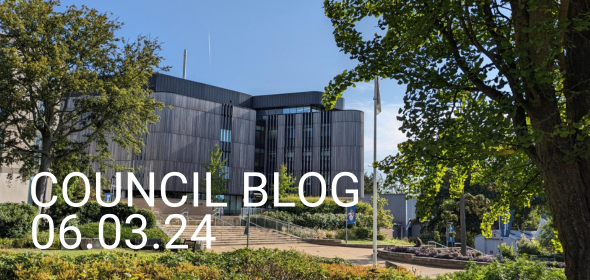Author: Philip Greenish, Chair of Council
Please note: information in this blog was accurate at the time of the meeting and may now have been superseded.

With the University’s growing presence in the City centre, we decided to hold the Council meeting in the Sir James Matthews (SJM) building on the afternoon of 6 March. Prior to the meeting, we were briefed by the new Dean of the Faculty of Arts and Humanities, Professor Miguel Mera, on his initial impressions of the faculty and his emerging priorities. He presented in the context of the place of arts and humanities in the University at the time of our Charter and then focused on the future, looking at the opportunities presented in delivering the Strategy and the exciting evolution of our estates. It was insightful and interesting. We then toured the area (in rare sunshine), visited the John Hansard Gallery with a briefing from the Director and his team and finally, toured the SJM building itself. The high quality of the internal refurbishment was clear to see.
As usual, the Vice Chancellor’s report at the start of the Council meeting covered important territory including: the response to the Tickell Report (the independent review of research bureaucracy); consultations on Research Excellence Framework 2029 (REF 29); a planned pilot review by the Technopolis Group on people, culture and environment in Higher Education (HE); the below inflation (2.5%) increase in student maintenance, which will increase pressure on our hardship funds; the implications of the Independent Review of University Spinout Companies, which has been accepted by Government and is likely to reduce university equity share of spinouts; OfS consultations on freedom of speech, the implications of which are unclear although additional, unfunded costs will fall to universities; and progress with the Class Action by students against universities for loss of teaching caused by strikes and COVID.
We also discussed international student recruitment, including recent negative publicity on a range of issues. Council is confident that our approach is ethical and fair, with no differential standards and with appropriate use of recruitment agents and our pathway provider. While there are indications of some softening in international applicants to UK universities, this is strongly differentiated across applicant nationalities and across the HE sector. We were told that our own international student recruitment this year is broadly on track. That said, much is changing across the world, and it represents an increasing risk.
We were pleased to hear of the renewal of our Disability Confident Leadership award and of the latest QS World University Sustainability league table result which rated Southampton as 13th in the UK and 54th in the world.
The President of the Student’s Union, Ed Brooker, presented his excellent written report. We discussed participation in sports and the commitment to active lifestyles and “health for all”. Council supported SUSU’s drive to make it easier for students to participate in formal and informal sport and exercise.
The University Economic Model was then approved by Council. There had been extensive discussion at Finance Committee the previous day on the importance of maintaining safe levels of liquidity (in simple terms, money to pay the bills) in future years when our capital investment has peaked, our investments have reduced in proportion and while student numbers are still increasing as planned in the strategy.
Professor Andrew Atherton, Vice-President (International and Engagement) then briefed on progress with our proposal to establish transnational education (TNE) in India. Council will discuss the business case and supporting evidence at our April Awayday. If our submission to the Indian University Grants Committee is successful, we expect a proposal to establish a campus in India to come to Council in July for approval.
Andrew then led a discussion on progress with developing the Digital Strategic Plan which we expect to come to Council for approval in May. This will be of fundamental importance to the University’s evolution over the next decade.
We approved the publication of the Annual Research Integrity Statement for 2022-2023, in compliance with the Concordat to Support Research Integrity. We approved the movement of endowment funds as recommended by Finance Committee, and we noted the management accounts which, as expected, show a lower level of financial surplus than recent years. Professor Deborah Gill, Vice-President (Education) reported to Council on work on our Teaching Excellence Framework (TEF) and National Student Survey (NSS) improvement plans, which was well received by Council. We also noted the (routine) report on our compliance with Office for Students (OfS) regulations and that we remain compliant.
Finally, Jo Donahoe, Director of Development and Alumni Relations, updated Council on the Campaign for Southampton following approval of its timings by the Campaign Leadership Group. As is normal with such campaigns, the quiet phase is underway, and it will not formally launch for some time. Council was impressed with all aspects of the plan and the potential for the Campaign to deliver exciting benefits.
The evening before the meeting, we met over dinner and enjoyed a presentation by Dr Neil Gostling, Lecturer in Evolution and Palaeobiology. Neil recently worked alongside Sir David Attenborough and the BBC researching the Pliosaur, which was the focus of his fascinating talk.
This is an informal summary of the Council meeting; formal minutes will be published in due course.